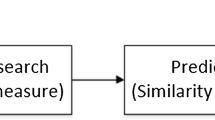Abstract
Ubiquitous recommendation systems predict new items of interest for a user, based on predictive relationship discovered between the user and other participants in Ubiquitous Commerce. In this paper, optimal associative neighbor mining, using attributes, for the purpose of improving accuracy and performance in ubiquitous recommendation systems, is proposed. This optimal associative neighbor mining selects the associative users that have similar preferences by extracting the attributes that most affect preferences. The associative user pattern comprising 3-AUs (groups of associative users composed of 3-users), is grouped through the ARHP algorithm. The approach is empirically evaluated, for comparison with the nearest-neighbor model and k-means clustering, using the MovieLens datasets. This method can solve the large-scale dataset problem without deteriorating accuracy quality.
Preview
Unable to display preview. Download preview PDF.
Similar content being viewed by others
References
Ding, C., He, X.: K-Means Clustering via Principal Component Analysis. In: Proc. of the 21st Int. Conf. on Machine Learning, pp. 225–232 (2004)
Herlocker, J.L., Konstan, J.A., Riedl, J.: Explaining Collaborative Filtering Recommendations. In: Proc. of the Conf. on Computer Supported Cooperative Work, pp. 241–250 (2000)
Han, E.H., Karypis, G., Kumar, V.: Clustering based on Association Rule Hypergraphs. In: Proc. of the SIGMOD 1997 Workshop on Research Issues in Data Mining and Knowledge Discovery, pp. 9–13 (1997)
Yu, H., Hatzivassiloglou, V.: Towards Answering Opinion Questions: Separating Facts from Opinions and Identifying the Polarity of Opinion Sentences. In: Proc. of the Conf. on Empirical Methods in Natural Language Processing (2003)
Jung, K.Y., Lee, J.H.: User Preference Mining through Hybrid Collaborative Filtering and Content-based Filtering in Recommendation System. IEICE Transaction on Information and Systems E87-D(12), 2781–2790 (2004)
Ko, S.-J., Lee, J.-H.: Optimization of Association Word Knowledge Base through Genetic Algorithm. In: Kambayashi, Y., Winiwarter, W., Arikawa, M. (eds.) DaWaK 2002. LNCS, vol. 2454, pp. 212–221. Springer, Heidelberg (2002)
Karypis, G.: Evaluation of Item-Based Top-N Recommendation Algorithms. Technical Report CS-TR-00-46, Computer Science Dept., University of Minnesota (2000)
Wang, J., de Vries, A.P., Reinders, M.J.T.: A User-Item Relevance Model for Log-Based Collaborative Filtering. In: Lalmas, M., MacFarlane, A., Rüger, S.M., Tombros, A., Tsikrika, T., Yavlinsky, A. (eds.) ECIR 2006. LNCS, vol. 3936, pp. 37–48. Springer, Heidelberg (2006)
MovieLens Collaborative Filtering Data Set (2000), Grouplens Research Project, http://www.cs.umn.edu/research/GroupLens/
Michael, T.: Maching Learning, pp. 154–200. McGraq-Hill (1997)
Torres, R., McNee, S.M., Abel, M., Konstan, J.A., Riedl, J.: Enhancing Digital Libraries with TechLens+. In: Proc. of the 4th ACM/IEEE Joint Conf. on Digital Libraries, pp. 228–237 (2004)
Herlocker, J.L., Konstan, J.A., Terveen, L.G., Riedl, J.T.: Evaluating Collaborative Filtering Recommender Systems. ACM Transactions on Information Systems (TOIS) archive 22(1), 5–53 (2004)
Kim, T.-H., Yang, S.-B.: Using Attributes to Improve Prediction Quality in Collaborative Filtering. In: Bauknecht, K., Bichler, M., Pröll, B. (eds.) EC-Web 2004. LNCS, vol. 3182, pp. 1–10. Springer, Heidelberg (2004)
Hwang, J.H., Gu, M.S., Ryu, K.H.: Context-Based Recommendation Service in Ubiquitous Commerce. In: Gervasi, O., Gavrilova, M.L., Kumar, V., Laganá, A., Lee, H.P., Mun, Y., Taniar, D., Tan, C.J.K. (eds.) ICCSA 2005. LNCS, vol. 3481, pp. 966–976. Springer, Heidelberg (2005)
Author information
Authors and Affiliations
Editor information
Editors and Affiliations
Rights and permissions
Copyright information
© 2006 Springer-Verlag Berlin Heidelberg
About this paper
Cite this paper
Jung, KY., Hwang, HJ., Kang, UG. (2006). Optimal Associative Neighbor Mining Using Attributes for Ubiquitous Recommendation Systems. In: Larsen, H.L., Pasi, G., Ortiz-Arroyo, D., Andreasen, T., Christiansen, H. (eds) Flexible Query Answering Systems. FQAS 2006. Lecture Notes in Computer Science(), vol 4027. Springer, Berlin, Heidelberg. https://doi.org/10.1007/11766254_38
Download citation
DOI: https://doi.org/10.1007/11766254_38
Publisher Name: Springer, Berlin, Heidelberg
Print ISBN: 978-3-540-34638-8
Online ISBN: 978-3-540-34639-5
eBook Packages: Computer ScienceComputer Science (R0)




